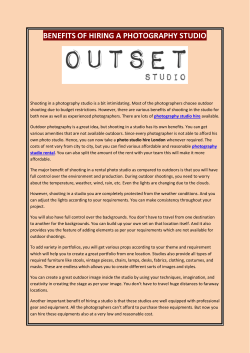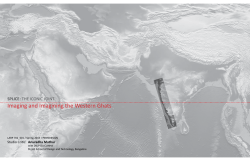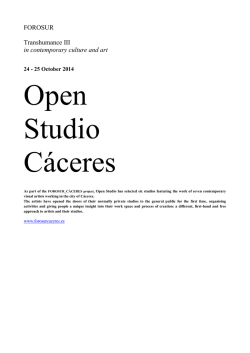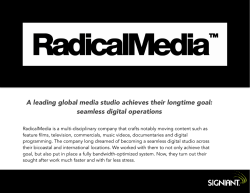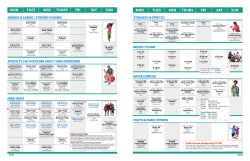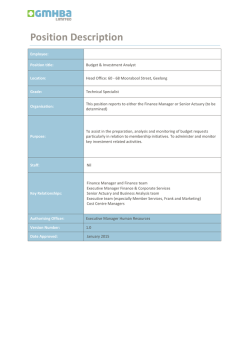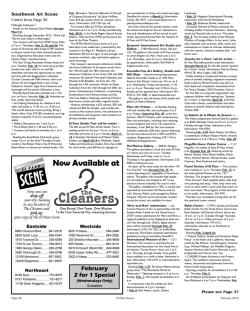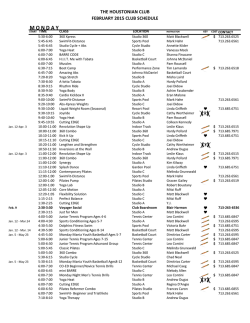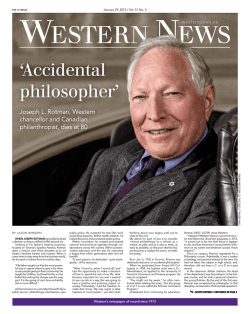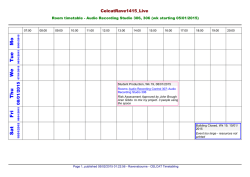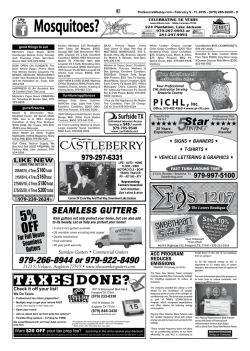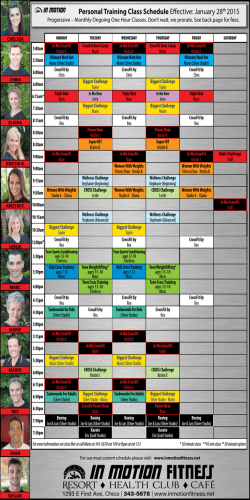
Digital Photography - VAS 2246B
Western University · Faculty of Arts and Humanities · Visual Arts Department Digital Photography - VAS 2246B Instructor: Dave Kemp Email: [email protected] Office: VAC 218 Office hours: Wednesday 1:30-2:30 Class time: Monday 2:30 - 5:30, Wednesday 2:30-5:30 Class location: NCB 120D Prerequisites: VAS 1020 Course Description This course introduces students to the fundamental concepts, techniques and strategies for the production of digitally-based photographic artwork. Through directed assignments, readings and lectures, students will become familiar with the critical, theoretical and historical debates surrounding digital photography. The course will include a significant technical component, but emphasis will be placed on producing strong artwork and effective visual communication in addition to acquiring new skills and demonstrating technical proficiency. The technical component will be essentially split with half of the course focusing on image capture and shooting techniques (e.g. proper use of camera and lenses, exposure, studio lighting techniques, composition), and the other half on post-production (e.g. importing RAW files, Photoshop techniques, colour management, digital printing). Additional lectures will explore contemporary photographic practices within the context of fine art as well as presenting an overview of the lineage of silver-based photography through to digital image making. Note: Through this course, students will be exposed to a very broad range of photographic art. Some of the most canonical or universally esteemed works depict what is commonly called ‘mature subject matter.’ Be forewarned that a small percentage of the visual material students will be expected to view is of an explicit nature, containing for example, scenes or depictions of sexual and/or violent acts. Students must accept that by taking this course they have consented to viewing such material. If this poses a problem for a student, for whatever reason, it must be BROUGHT TO THE IMMEDIATE ATTENTION OF THE INSTRUCTOR (DURING THE FIRST CLASS). Class Format Each class will meet in room 120D of the North Campus Building prior to working in other production and/or seminar spaces. Generally, classes will start with a short lecture on a technical or theoretical aspect of digital photography. Following this, students can move on to work on their projects under the guidance of the instructor. Occasionally special workshops, in-class miniassignments, critiques, video screenings and extended lectures will take up the full class period. While students will have a limited amount of in-class time to experiment and complete assignments, they will also be required to work outside of class time for a minimum of 10 hours/week. This will involve booking equipment and space ahead of time. Course Objectives Upon successful completion of the course, students should be able to: Effectively use a digital SLR camera to produce technically proficient images. Demonstrate a basic understanding of light, and how it affects image quality and overall impact. Work with post-production software and digital printing techniques. Understand the historical development of digital photography from its roots in silver-based image making. Effectively communicate their ideas though the use of visual media. Speak about their artwork and intentions in a mature and articulate way: both written and verbal. Critique the artwork of others in a fair and useful manner. Use an appropriate vocabulary for photographic and digitally-based artwork Course Requirements & Materials All readings will be supplied in PDF format via OWL. Active e-mail address (communications outside of class will be done via e-mails) and OWL. Active UWO card (Western One Card) for access to the labs. A DSLR camera (of 6 megapixels or greater and capable of shooting RAW images) is strongly recommended but not required. A few digital DSLR cameras are available in the Visual Arts sign-out office, but these are often in high demand, particularly during end of term when many students require them for their assignments. A personal laptop is useful although not required. External storage media: Flash Drive/USB key (min. 4 GB). Having multiple USB keys would be advantageous in terms of submitting the digital components of many assignments. Recordable DVD’s for final outputs (you can purchase these when needed). Departmental mailing envelopes for assignment submissions. High quality digital printing is available on the Visual Arts Epson printer for approximately $7 per square foot. Projects Projects are designed to combine the technical skills that students learn in class with aesthetic and conceptual ideas related to the course readings and lectures. Each project has its own grading criteria (details will be given at the beginning of each project introduction) which will consist of technical skills and conceptual understandings. Project 1: The Found Image Due for critique, Wednesday January 28, 2015 Project 2: The Constructed Image Due for critique, Wednesday February 25, 2015 Project 3: The Impossible Self-Portrait Due for critique Monday March 16, 2015 Project 4: Your Own Vision Due for critique Wednesday April 8, 2015 Course Evaluation: Requirements Grade ________________________________________________ Project #1 15% Project #2 15% Project #3 15% Project #4 20% In-class Technical Exercises 10% Written Work / Presentations 15% Attendance / Participation 10% _________________________________________________ Total 100% Grading Criteria Studio assignments will be based on the following criteria: Technical requirements Technical integration with the idea Understanding of project concepts and the ability to express that understanding Degree of inventiveness and ambition of assignments Participation and commitment to all class activities Written assignments will be based on the following criteria: Writing style Clarity Citing when it is needed Presentations will be based on the following criteria: Level of research Clarity in delivery Integration of the class readings and discussions Support material Plagiarism is a serious academic offense. Be certain to give citations for all the sources you utilize in your written work. Note to studio projects, you are not allowed to submit the same project to two different classes. If projects are designed that necessitate the use of pre-existing media materials (i.e. film clips and/or music samples) you will have to speak with the course instructor or TA first to make sure that you are using these materials in an informed way so as not to infringing Canadian copyright law. (See the Undergraduate Polices attached to this syllabus) A one-time, late penalty of 10% will be applied to all late submissions without official (medical) documentation. Students seeking academic accommodation on medical grounds for any missed tests, exams, participation components and/or assignments worth 10% or more of their final grade must apply to the Academic Counseling Office of their home Faculty and PROVIDE MEDICAL DOCUMENTATION. Academic accommodation cannot be granted by the instructor or department. (See the Undergraduate Polices attached to this syllabus) Based on the student’s success in meeting the above criteria grades will be assessed on the following. 90-100 (Outstanding, A+) - The studio work shows significant originality and exhibits a high degree of critical engagement. Sophisticated analysis and synthesis involving complex theoretical and conceptual thinking are demonstrated. Mastery of complex ideas is immediately evident. The studio work has originality, clarity and ambition. The project is treated with sensitivity and subtlety of thought. The quality of the background preparation and research, engagement with process and outcome of the studio production is exemplary. 80-89 (Excellent, A) - The studio work shows originality and exhibits a high degree of critical engagement. The work is clearly focused and intelligently presented. Mastery of complex ideas is demonstrated. The studio work has clarity and ambition. The quality of the studio production immediately engages the viewer. The studio work has been sufficiently developed and demonstrates mastery of techniques so that results are compelling. Background preparation and research, engagement with process and outcome of the studio production is impressive. 75-79 (Very Good, B+) - The studio work shows above average analysis, critical thinking and independent thought. It demonstrates a clear awareness of the parameters of the assignment and a very good attempt to respond creatively to them. The work demonstrates reasonable depth and/or breadth and engages in a production that is appropriate to the level of the course. The quality of studio work engages the viewer and demonstrates above-average mastery of techniques. Background preparation and research, engagement with process and outcome of the studio production is very good. 70-74 (Good, B) - The studio work shows a satisfactory attempt at analysis and critical thinking. It shows a good attempt to respond to assignment parameters. The work demonstrates some depth and/or breadth, making references to appropriate course material/art context. The studio production engages the viewer and demonstrates a sufficient mastery of techniques. Background preparation and research, engagement with process and outcome of the studio production is satisfactory. 60-69 (Competent, C) - The studio work demonstrates adequate engagement with the project. It shows an attempt to respond to assignment parameters but does so at a very basic level that lacks creativity. Engagement with studio production demonstrates basic mastery of techniques. Background preparation and research, engagement with process and outcome of the studio production is competent. 50-59 (Marginal, D) - The studio work shows less than adequate engagement with the topic and with the material covered by the course. The studio work waivers in its attempt to respond to assignment parameters and tends to be simplistic. Engagement with studio production demonstrates less than a basic mastery of techniques. Background preparation and research, engagement with process and outcome of the studio production is less than satisfactory. Below 50 (Unacceptable, F) - The studio work demonstrates a failure to comprehend/engage the topic. The studio work is incomplete and lacks redeeming creative merit. The work clearly does not meet the minimal requirements of the assignment. Background preparation and research, engagement with process and outcome of the studio production is unacceptable. Departmental Policies Student Conduct: All students will conduct themselves in a manner that will be consistent with the maturity and academic integrity expected of university students. Student conduct shall be consistent with the general laws of the community and with University regulations. Students shall show regard and respect for the rights, safety, and property of all members of the University community and are expected to act in a responsible manner within the University and the community at large. Attendance: A student who misses more than 15% of the course hours, without written corroboration for health or bereavement, can be debarred from writing final exams, or participation in final studio evaluations. Note that if a student consistently is absent from a 3-hour class for 1 hour, they will exceed the 15% cutoff and can be debarred. Prerequisites: You are responsible for ensuring that you have successfully completed all course prerequisites and that you have not taken an antirequisite course. Lack of prerequisites may not be used as basis of appeal. If you are not eligible for a course, you may be removed from it at any time, and you will receive no adjustment to your fees. These decisions cannot be appealed. Plagiarism: Plagiarism, which may be defined as “The act or an instance of copying or stealing another’s words or ideas and attributing them as one’s own,” th will not be tolerated. (Citation excerpted from Black’s Law Dictionary, 1999, 7 ed., p. 1170). (Refer to www.westerncalendar.uwo.ca/2014/pg113.html# or the 2014/2015 Western Academic Calendar, p. 19, with regards to academic penalties for plagiarism.) Medical Policy: Students seeking academic accommodation on medical grounds for any missed tests, exams, participation components and/or assignments worth 10% or more of their final grade must apply to the Academic Counselling office of their home Faculty and provide documentation. Academic accommodation cannot be granted by the instructor or department. See course outline for specific arrangements regarding less than 10% of assignments. Accommodation for missed assignments, or attendance, totalling less than 10%, due to medical reasons, may be arranged with the instructor as long as the student contacts the instructor no later than the day after the assignment or attendance is due. Mental Health Policy: Students who are in emotional/mental distress should refer to Mental Health@Western http://www.health.uwo.ca/mental_health/ for a complete list of options about how to obtain help. Building Access: The John Labatt Visual Arts Centre will be closed at 10:00 pm each night. There will be no after-hour access for undergraduate students. The Centre is open weekends 12:00 noon-5:00 pm. Students should be prepared to vacate the building promptly at 10:00 pm and 5:00 pm. You must also signin with the building monitors when working in the workshop areas outside of regular office hours. Please remember: One of the most important resources for course counselling, special permissions, course changes, grade appeals, etc., is the Undergraduate Chair of Visual Arts, Prof. C. Barteet (tel. 519-661-2111 ext. 86182; [email protected]). Please note, however, that should you encounter any serious difficulties due to illness, family emergency, etc., you should consult the Academic Counselor for your Faculty (Mr. Ben Hakala, Academic Counselor for the Faculty of Arts and Humanities). The Student Development Centre (WSS room 4111; tel: 519-661-3031; www.sdc.uwo.ca) offers a wide range of useful services to students including workshops on learning skills, career and employment services, and an effective writing program, amongst many more. The D.B. Weldon Library offers orientation tours from the first week of classes until Thanksgiving, where you will get acquainted with the numerous research resources available. As well, the University libraries have an extremely useful website where you can search the library system, the databases, view your circulation record, renew materials, access your UWO e-mail account, and much more. Check it out at: www.lib.uwo.ca. Financial Aid Services is your main source of information for OSAP, bursaries, loans, scholarships, and the work-study program which offer part-time positions on campus for Western students. Tel: 519-661-2100; e-mail, [email protected]; or check out their website at http://www.registrar.uwo.ca/student_finances/financial_counselling.html
© Copyright 2026
